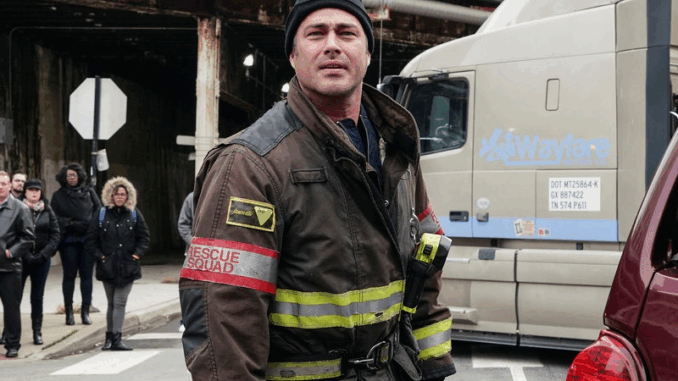
For over a decade, Lieutenant Kelly Severide (Taylor Kinney) has been the undisputed action star and emotional anchor of Chicago Fire. He is the character most consistently placed in life-threatening scenarios, driving the show’s most spectacular rescues. Yet, despite his resilience, every season finale or mid-season break inevitably leaves fans wrestling with the same dread: is this the time Severide doesn’t walk away?
The Season 14 Fall Finale, “A Simple Plan,” was no exception. While the episode appeared to resolve his deep-seated issues regarding the Office of Fire Investigation (OFI) and his marriage to Stella Kidd (Miranda Rae Mayo), the writers deployed a classic, chilling technique that immediately replaced personal conflict with professional peril. The final moments of the episode, combined with the new, looming institutional threat to Firehouse 51, have once again left Severide fans deeply worried he might die in the upcoming Winter Premiere.
The anxiety surrounding Severide’s fate is fueled by a perfect storm of narrative tension, actor contract history, and the show’s strategic need for massive, consequential stakes to launch its next major arc—a need that could tragically be met by the ultimate sacrifice from the leader of Squad 3.
🛑 The Perilous Resolution: Why Closure is Ominous
The Fall Finale felt conspicuously neat, resolving almost every major personal conflict for the ensemble—a dramatic choice that, in the world of serialized television, is often a precursor to tragedy.
The Kidd-Severide Peace Treaty
The bulk of Severide’s arc leading up to the finale focused on the strain placed on his marriage due to his OFI commitment and his perceived withdrawal from Firehouse 51. The finale offered a genuine, heartfelt resolution:
-
The Compromise: Severide and Kidd agreed to boundaries, with Severide promising to prioritize their marriage and his responsibilities to Squad 3, while Kidd accepted his need for the intellectual challenge of OFI work.
-
The Problem: By fully resolving this deeply personal, character-driven conflict, the writers have eliminated the internal tension that made Severide relatable. With his marriage stable and his commitment to 51 reaffirmed, he is now free to face a purely external threat. In the Chicago Fire universe, a character being too stable or too happy often means they are being fattened for the slaughter.
The lack of personal entanglement frees the writers to use Severide’s body as the ultimate catalyst for the looming political war—the ultimate dramatic mechanism to show the cost of the job.
💥 The New Threat: Fire and Bureaucracy
The finale replaced Severide’s personal issues with two massive, interlocking threats that place him directly in harm’s way.
1. The Budget Crisis (The Institutional Threat)
The episode concluded with the ominous news that the City Council’s budget cuts necessitate the decommissioning of a fire company.
-
The Ultimate Catalyst: If a firefighter were to die due to delayed response times, understaffing, or faulty equipment—all direct consequences of budget cuts—it would provide the absolute emotional and political fuel needed to launch the season’s war against the City Council. Severide, as the face of the action, is the most likely candidate to be caught in a scenario where bureaucracy fails the heroes. His death would instantly transform the political plotline from a financial debate into a moral crusade for all of Firehouse 51.
2. The Ominous Foreshadowing (The Fire Threat)
Though the show resolved the OFI conflict, it reinforced Severide’s penchant for deep-diving into the most dangerous, unstable scenes—a habit that has placed him in peril before (recall his near-death experience in the yacht fire).
-
Squad 3’s Destiny: As the leader of Squad 3, Severide and his crew are the designated high-risk, confined-space, and technical rescue specialists. They are the first ones called into structural collapses, dangerous chemical spills, or entrapments—the exact scenarios where the failure of under-funded equipment would lead to a fatal outcome.
-
The Unresolved OFI Mindset: Even with the compromise, Severide is still thinking like an investigator, seeking the deeper truth behind the flames. This investigative mindset often leads him to stay in a dangerous environment longer than necessary, pursuing evidence rather than prioritizing his own immediate safety.
💔 The Actor Factor: Contract Anxiety
The anxiety surrounding Severide’s survival is perpetually compounded by Taylor Kinney’s past contractual history and extended leaves of absence from the show.
-
Past Leaves: Kinney’s previous, prolonged leave of absence—cited as a necessary time away for personal matters—created genuine concern among the fanbase about the actor’s long-term commitment to the arduous schedule of a Dick Wolf procedural.
-
The Replacement Narrative: While the show creatively handled his absence by sending Severide to an out-of-state OFI training, the narrative framework is always in place: the writers know how to temporarily write him out, or permanently remove him, if necessary. Every time a major contract negotiation looms or a new personal leave is needed, the writers have a dramatic, high-stakes death scene ready to go.
This history means that any prolonged absence or even a minor scheduling conflict can trigger fears that the show is finally executing the “nuclear option” and ending the Severide arc permanently.
🔑 Conclusion: The Show’s Ultimate Death Bait
The Chicago Fire Season 14 Fall Finale skillfully manufactured a scenario that leaves Lieutenant Kelly Severide in the most vulnerable position possible: emotionally stable but professionally exposed.
By resolving his personal conflicts, the show has cleared the decks for Severide to become the ultimate sacrifice needed to validate the severity of the new political/institutional threat facing Firehouse 51. The combination of his high-risk job, the looming budget cuts, and the franchise’s historical pattern of using Severide as the ultimate death bait leaves fans with every reason to fear that the man who survived a decade of trauma might fall victim to the one enemy he can’t fight with an axe: bureaucratic neglect.
The Winter Premiere will undoubtedly force the entire ensemble to fight for Severide’s life—or his memory—and the continued existence of Firehouse 51. The stakes have never been higher, and for Severide fans, the anxiety is excruciatingly real.